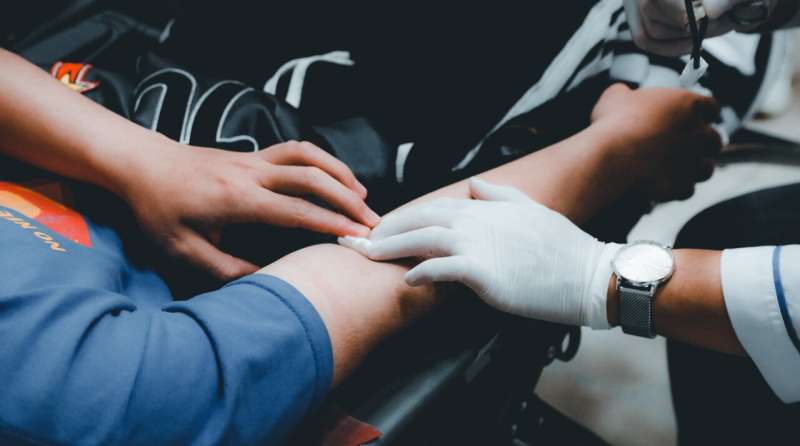Blood
Keeping the ‘warm glow’ of giving going significantly boosts repeat blood donations
New research has shown that boosting the “warm glow” feeling that people experience after giving blood significantly increases repeat blood donations, which are essential for the effective running of any health service.
The research, led by the University of Nottingham shows that the positive feelings that people experience from helping others, help sustain long-term helping that is beneficial to wider society. The ideas uncovered in this research could also be applied to improve the take-up of vaccinations.
Researchers from the University of Nottingham’s School of Psychology worked with the University of Queensland and Australian Red Cross Lifeblood to refine and target messaging to blood donors and showed that reinforcing feelings of warm glow feeling following blood donation boosts repeat appointments. The results have been published today in Nature Human Behavior.
One of the key studies in this research targeted first-time donors in Australia six weeks after their first donation and compared standard donor messaging with messages with an emphasis on the warm glow gained from donating and reinforcing the person’s identity as a blood donor.
An example message read, “We hope you’ve been basking in the warm glow that comes with donating blood, because six weeks ago as the day you became a blood donor”

The warm-glow messaging resulted in over a 6% increase (approximately 3,000 donations) in donations attributed to the warm-glow message.
Blood is an essential medicine as defined by the WHO– like antibiotics are—for the successful delivery of health care. Blood and its products are used in trauma, surgery, childbirth, to treat burns, cancer, hemophilia and other clotting disorders, sickle cell, thalassemia, palliative care, eye drop medications, and many more. This supply of blood is met by 3% of the eligible population who donate blood.
“This research examines the reasons why people continue to participate in ‘high-cost’ altruistic acts like giving blood. We know that people experience feelings of warm glow form giving and, we wanted to see if warm glow could be boosted to encourage repeat donations,” says Professor Eamonn Ferguson, of the School of Psychology
The study identified two types of people—those who experience stronger warm glow that lasts, these people are likely to book to donate again (the ‘warm-cooperators’), and a group called ‘cool co-operators’ who experience a warm glow but to a less extent– these people are the ones who are less likely to re-book an appointment to donate and who benefit the most from being reminded of the warm glow feeling with specific messaging.
According to Australian Red Cross Lifeblood, “Every year in Australia more than 40,000 people donate blood or plasma for the first time but never return for a second donation. And, of the half a million people who donate each year, more than 60 percent make fewer than three donations.”
“Without repeat blood donors we can’t maintain a safe and stable blood supply, which saves thousands of Australian lives every year, and ensures that blood is readily available whenever and wherever it is needed. This research is critical in helping blood services find ways to solve this problem, which is faced by many countries including Australia.”
Professor Ferguson continues, “The warm glow we feel from helping others motivates us to help again. Some people feel more warm glow than others, for those who feel less warm glow, the cooler cooperators, the warming messaging is even more beneficial. This is seen clearly for one public health resource, donating blood, but understanding warm glow could also help in other public health areas like messaging for vaccinations, by tapping into the warm glow that comes from helping to protect others.”
More information:
Ferguson, E. et al, Warming up cool cooperators. Nature Human Behavior (2023). DOI: 10.1038/s41562-023-01687-6 www.nature.com/articles/s41562-023-01687-6
University of Nottingham
Citation:
Keeping the ‘warm glow’ of giving going significantly boosts repeat blood donations (2023, September 14)
retrieved 14 September 2023
from https://medicalxpress.com/news/2023-09-significantly-boosts-blood-donations.html
This document is subject to copyright. Apart from any fair dealing for the purpose of private study or research, no
part may be reproduced without the written permission. The content is provided for information purposes only.

